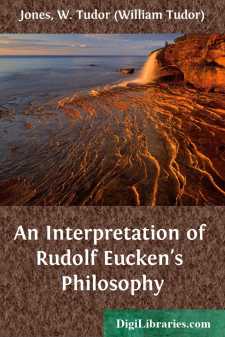Categories
- Antiques & Collectibles 13
- Architecture 36
- Art 48
- Bibles 22
- Biography & Autobiography 813
- Body, Mind & Spirit 142
- Business & Economics 28
- Children's Books 16
- Children's Fiction 13
- Computers 4
- Cooking 94
- Crafts & Hobbies 4
- Drama 346
- Education 46
- Family & Relationships 57
- Fiction 11829
- Games 19
- Gardening 17
- Health & Fitness 34
- History 1377
- House & Home 1
- Humor 147
- Juvenile Fiction 1873
- Juvenile Nonfiction 202
- Language Arts & Disciplines 88
- Law 16
- Literary Collections 686
- Literary Criticism 179
- Mathematics 13
- Medical 41
- Music 40
- Nature 179
- Non-Classifiable 1768
- Performing Arts 7
- Periodicals 1453
- Philosophy 64
- Photography 2
- Poetry 896
- Political Science 203
- Psychology 42
- Reference 154
- Religion 513
- Science 126
- Self-Help 84
- Social Science 81
- Sports & Recreation 34
- Study Aids 3
- Technology & Engineering 59
- Transportation 23
- Travel 463
- True Crime 29
An Interpretation of Rudolf Eucken's Philosophy
Categories:
Description:
Excerpt
INTRODUCTION
Rudolf Eucken was born at Aurich, East Frisia, on the 5th of January 1846. He lost his father when quite a child. His mother, the daughter of a Liberal clergyman, was a woman of deep religious experience and of rich intellectual gifts. When quite a boy he came at school under the influence of the theologian Reuter, a man of wonderful fascination to young men. The questions of religion and the need of religious experience interested Eucken early, and these have never parted from him during the long years which have since passed away.
At an early age he entered the University of Göttingen and attended the philosophical classes of Hermann Lotze. Lotze interested him in philosophical problems, but did not satisfy the burning desire for religious experience which was in the young man's soul. Lotze looked at religion and all else from the intellectual point of view. His main business was to discover proofs for the things of the spirit, and the value of his work in this direction cannot be over-estimated. Hermann Lotze's works are with us to-day; and he has probably made more important contributions to philosophy and religion from the scientific side than any other writer of the latter half of the nineteenth century. But he seems to have been a man who was inclined to conceive of reality as something which had value only in so far as it was known, and left very largely out of account the inchoate stirrings and aspirations which are found at a deeper level within the human soul than the knowing level. Life is larger and deeper than logic, and is something, despite all our efforts, which resists being reduced to logical propositions. It is quite easy to understand how a young man of Eucken's temperament and training should acquiesce in all the logical treatment of Lotze's philosophy, and still find that more was to be obtained from other sources which had quenched the thirst of the great men of the past.
When Eucken entered the University of Berlin he came into contact with a teacher who helped him immensely in the quest for religion, and in the interpretation of religion as the issue of that quest. Adolf Trendelenburg was a great teacher as well as a noble idealist, and his influence upon young Eucken was very great. Indeed, it seems that Trendelenburg's influence was great on the life of every young man who was fortunate enough to come into contact with him. The late Professor Paulsen, in his beautiful autobiography, Aus meinem Leben (1909), presents us with a vivid picture of Trendelenburg and his work. Under him the pupils came into close touch not only with the meaning but also with the spirit of Plato and Aristotle. The pupils were made to see the ideal life in all its charm and glory. The great Professor had all his lifetime lived and meditated in this pure atmosphere, and possessed the gift of infusing something of his own enthusiasm into the minds and spirits of his hearers. Eucken has stated on several occasions his indebtedness to Trendelenburg....


